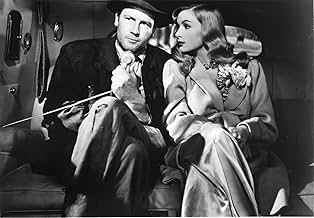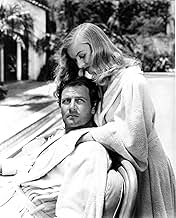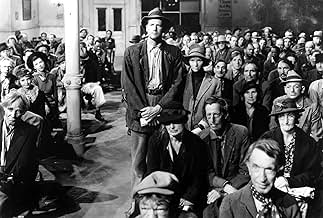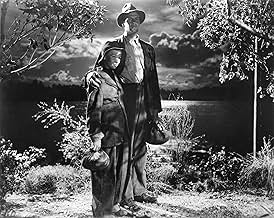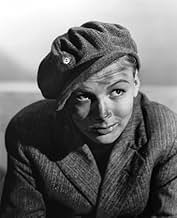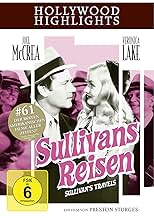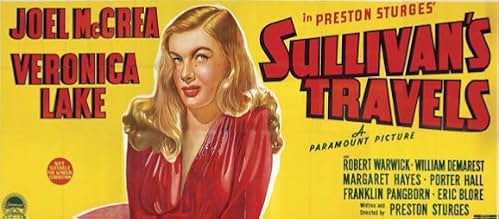AVALIAÇÃO DA IMDb
7,9/10
30 mil
SUA AVALIAÇÃO
John L. Sullivan, um diretor de Hollywood, se propõe a viver como um sem-teto a fim de adquirir experiência de vida relevante para seu próximo filme.John L. Sullivan, um diretor de Hollywood, se propõe a viver como um sem-teto a fim de adquirir experiência de vida relevante para seu próximo filme.John L. Sullivan, um diretor de Hollywood, se propõe a viver como um sem-teto a fim de adquirir experiência de vida relevante para seu próximo filme.
- Prêmios
- 2 vitórias no total
Charles R. Moore
- Colored Chef
- (as Charles Moore)
Avaliações em destaque
After the opening credits, the film opens with the following statement.
"To the memory of those who made us laugh: the motley mountebanks, the clowns, the buffoons, in all times and in all nations whose efforts have lightened our burden a little, this picture is affectionately dedicated."
With this film, Preston Sturges made one of the smartest and most insightful comedies ever to come out of Hollywood, in which he especially held up the mirror to Tinseltown itself. A Hollywood variation on Gulliver's Travels, it's the tale of Hollywood director John Sullivan (Joel McCrea), tired of making Hollywood Fluff, who wants to branch out with a socially conscious epic, called "O Brother, Where Art Thou", and sets out to research the meaning of poverty. His studio bosses (very funny roles by Robert Warwick and Porter Hall) try to tell him it's a ridiculous idea but Sullivan insists, puts on some hobo clothes and sets out to see what it's like to experience poverty and suffering. The studio soon sees it as potential publicity stunt and sent an entire crew to follow him around during his trip.
Some very enjoyable references to socially conscious movie-making, to Ernst Lubitch in particular, make this particularly fun with some knowledge of the period and the films mentioned, albeit not necessary. And almost worth seeing alone for Veronica Lake's memorable performance as a failed starlet.
According to Sturges, the film did contain a little "message":
"SULLIVAN'S TRAVELS is the result of an urge, an urge to tell some of my fellow filmwrights that they were getting a little too deep-dish and to leave the preaching to the preachers."
By any means, he made a uniquely self-reflective comedy about Hollywood with wonderful characterizations and superlative performances. A brilliant satire with a "message" just as poignant as ever.
Camera Obscura --- 9/10
"To the memory of those who made us laugh: the motley mountebanks, the clowns, the buffoons, in all times and in all nations whose efforts have lightened our burden a little, this picture is affectionately dedicated."
With this film, Preston Sturges made one of the smartest and most insightful comedies ever to come out of Hollywood, in which he especially held up the mirror to Tinseltown itself. A Hollywood variation on Gulliver's Travels, it's the tale of Hollywood director John Sullivan (Joel McCrea), tired of making Hollywood Fluff, who wants to branch out with a socially conscious epic, called "O Brother, Where Art Thou", and sets out to research the meaning of poverty. His studio bosses (very funny roles by Robert Warwick and Porter Hall) try to tell him it's a ridiculous idea but Sullivan insists, puts on some hobo clothes and sets out to see what it's like to experience poverty and suffering. The studio soon sees it as potential publicity stunt and sent an entire crew to follow him around during his trip.
Some very enjoyable references to socially conscious movie-making, to Ernst Lubitch in particular, make this particularly fun with some knowledge of the period and the films mentioned, albeit not necessary. And almost worth seeing alone for Veronica Lake's memorable performance as a failed starlet.
According to Sturges, the film did contain a little "message":
"SULLIVAN'S TRAVELS is the result of an urge, an urge to tell some of my fellow filmwrights that they were getting a little too deep-dish and to leave the preaching to the preachers."
By any means, he made a uniquely self-reflective comedy about Hollywood with wonderful characterizations and superlative performances. A brilliant satire with a "message" just as poignant as ever.
Camera Obscura --- 9/10
As a professional circus clown for twenty years,I think that Sullivan's Travels is the best, most lucid, explanation of what comedy is all about that has ever been made. Sure it's hokey, corny, contrived, and meandering. But so is all great comedy, from Shakespeare to Seinfeld! If you want your comedy to be tightly constructed, meaningful, unambiguous, and logical, then you do not want comedy at all -- you want some stuffy college professor's idea of What is Comedy for a term paper.
The glorious truth is that you cannot domesticate great comedy. It occurs on no regular basis, from no reliable source, and is accountable to no one for what it says and does. Preston Sturges wanted to make that point in Sullivans Travels and he does so exceedingly well with everything from slapstick frolics in the land cruiser to fleas in the bed to hectoring soliloquies about poverty from the butler.
Ten years before Chaplin tried to explain the same thing in his movie Limelight, Sturges tells a tale meant to both hearten and cozen us. It heartens us to know that a cynical, moneygrubbing place like Hollywood will continue to spin out comedies, because they make money. And it cozens us into thinking there is something magical about comedians. Anyone who has ever actually known or been married to a professional funnyperson knows they are by turns grumpy, lazy, tempermental, stubborn, and always insecure. Not the life of the party. But so what? They're clowns, god bless 'em, and that's all that counts.
You'll never understand the craft of humor if you don't watch, and love, Preston Sturges Sullivan's Travels!
The glorious truth is that you cannot domesticate great comedy. It occurs on no regular basis, from no reliable source, and is accountable to no one for what it says and does. Preston Sturges wanted to make that point in Sullivans Travels and he does so exceedingly well with everything from slapstick frolics in the land cruiser to fleas in the bed to hectoring soliloquies about poverty from the butler.
Ten years before Chaplin tried to explain the same thing in his movie Limelight, Sturges tells a tale meant to both hearten and cozen us. It heartens us to know that a cynical, moneygrubbing place like Hollywood will continue to spin out comedies, because they make money. And it cozens us into thinking there is something magical about comedians. Anyone who has ever actually known or been married to a professional funnyperson knows they are by turns grumpy, lazy, tempermental, stubborn, and always insecure. Not the life of the party. But so what? They're clowns, god bless 'em, and that's all that counts.
You'll never understand the craft of humor if you don't watch, and love, Preston Sturges Sullivan's Travels!
In Hollywood, the spoiled director of humdrum movies, John Lloyd Sullivan (Joel McCrea), was born in silver spoon but is very successful with his superficial comedies. Out of the blue, he tells to his producer Mr. LeBrand (Robert Warwick) that he wants to make serious dramas, like "O Brother, Where Art Thou?" and he will live like a tramp on the streets to learn the sorrows of great part of the population. He wears cheap clothes and tries to blend with poor people but he always returns to Hollywood protected by the safety team hired by the studio.
One day, he goes to a dinner with a coin and a blonde girl (Veronica Lake) offers bacon and eggs to him. Soon he learns that the girl is a failed actress that had never a chance in Hollywood and is returning home hitchhiking without any money. Sullivan decides to retribute her kindness giving a ride to her in his car but they are arrested by the police. When they are released, the girl decides to join Sullivan in his quest to learn about poverty. When Sullivan is satisfied, he is robbed and dumped unconscious in a train. He awakes in the countryside where there is an incident and he is arrested and sentenced to a labor camp, where he leans the importance of comedy in the miserable lives of destitute people.
"Sullivan's Travels" is a delightful movie by Preston Sturges with a satire of Hollywood lifestyle and the importance of comedy in the life of people, a relief for a couple of minutes for those that do not have other sort of entertainment. Joel McCrea is very funny in the role of a naive director trying to find how the poor people live. His chemistry with the gorgeous Veronika Lake is perfect and this was the first time that I noted that this lovely actress was only 1.51 m height. My vote is eight.
Title (Brazil): "Contrastes Humanos" ("Human Contrasts")
One day, he goes to a dinner with a coin and a blonde girl (Veronica Lake) offers bacon and eggs to him. Soon he learns that the girl is a failed actress that had never a chance in Hollywood and is returning home hitchhiking without any money. Sullivan decides to retribute her kindness giving a ride to her in his car but they are arrested by the police. When they are released, the girl decides to join Sullivan in his quest to learn about poverty. When Sullivan is satisfied, he is robbed and dumped unconscious in a train. He awakes in the countryside where there is an incident and he is arrested and sentenced to a labor camp, where he leans the importance of comedy in the miserable lives of destitute people.
"Sullivan's Travels" is a delightful movie by Preston Sturges with a satire of Hollywood lifestyle and the importance of comedy in the life of people, a relief for a couple of minutes for those that do not have other sort of entertainment. Joel McCrea is very funny in the role of a naive director trying to find how the poor people live. His chemistry with the gorgeous Veronika Lake is perfect and this was the first time that I noted that this lovely actress was only 1.51 m height. My vote is eight.
Title (Brazil): "Contrastes Humanos" ("Human Contrasts")
Having read some of the negative views on this film, I think it's necessary to take the long view. Anybody can have an opinion, but when people like Steven Spielberg, George Lucas, Sydney Pollack, Leonard Maltin and Roger Ebert place this film in their best 20 list, there must be a reason. First, Preston Sturgis, a genius, they even named a building after him on the Paramount Studio Lot. Seven big hit films in seven years, plus he had a giant reputation as a Broadway playwright. Although some may disagree, I think this film was his masterpiece. The scene in the poor black church, where the convicts go in shackles is so brilliant, it ranks with some of the best filmmaking on the planet. I've heard people say it was stereotypical, yet unfortunately, that's the way it was then. The juxtaposition of the convicts, who had lost their civil rights, and the poor African Americans who never had civil rights, mated to the song, "Let My People Go", puts this film heads and shoulders against anything anybody was doing in 1942.
Joel McCrea gives the performance of his career. I fell totally in love with Veronica Lake; who wouldn't? The first scene lasts five minutes without a cut. To the MTV generation this is mortal sin, but Sturgis, having come from the theater, lets his actors, act. When I was a film student, I learned more from this film, than any other of which I can think at the moment. It is a classic's classic. If you choose not to watch it, then you're missing something that formed the directing habits of the best directors of our era. In other words, you are the loser.
10/10
Joel McCrea gives the performance of his career. I fell totally in love with Veronica Lake; who wouldn't? The first scene lasts five minutes without a cut. To the MTV generation this is mortal sin, but Sturgis, having come from the theater, lets his actors, act. When I was a film student, I learned more from this film, than any other of which I can think at the moment. It is a classic's classic. If you choose not to watch it, then you're missing something that formed the directing habits of the best directors of our era. In other words, you are the loser.
10/10
10jhclues
When it comes right down to it, what you `think' you want isn't necessarily what you `really' want, nor is it likely to be anything you need. But finding the answer is up to the individual, a prospect that's explored in the satirical `Sullivan's Travels,' directed by Preston Sturges. Movie director John L. Sullivan (Joel McCrea) has made a career of churning out one successful comedy after another, yet he remains unfulfilled. He longs to do a `serious' film, one with meaning, a drama that will leave his mark on the industry and the world. And he has a property that he thinks is perfect, a screenplay entitled `O Brother, Where Art Thou?' The studio he works for, however, balks at the idea; Sullivan's comedies are not only good, they're a cash cow for the studio, so why fool with success?
Sullivan is adamant, though, and determined to make his film he strikes a bargain with the studio and gets the green light. But once he's given the go-ahead, he wants to do it right-- and he realizes that to make a truly meaningful film, he must first experience himself the hardships of life he will be examining in `O Brother.' So with only a dime in his pockets, he sets out on the road to find out what `life' is really all about. And before it's over, he will get all he's looking for and more, in an odyssey that will be unforgettable for Sullivan, and for the audience, as well.
Filled with pathos and poignancy, Sturges' film is an insightful sojourn across the territory of the human condition. It'll make you laugh and it'll make you cry, as along with Sullivan you come face to face with some hard truths about reality. And Sullivan's eventual epiphany regarding his personal wants and needs may be your own, as well, because this is a film with a definite message that is honest and undeniable. A lesson in life delivered subtly and sensitively by Sturges, who makes it entertaining and thought provoking at the same time. It's refreshing, in fact, t discover a film that delivers such an impact without having to resort to any kind of sensationalism, relying instead on the inherent humanity of the story, which Sturges conveys masterfully. With exceptions, of course, it's a sensibility few of today's directors seem to possess. Some notable exceptions would be Ang Lee with `The Ice Storm,' Kenneth Lonergan's `You Can Count On Me' and Tom DiCillo's `Box of Moonlight.' All are films that, like `Sullivan,' are journeys of discovery, profound in sentiment without being overly sentimental. There are more, to be sure, but they seem too few and far between.
One of the elements that makes this film so engaging is its colorful cast of characters, and the actors it employs to bring it to life, beginning with it's star, McCrea, who hits his stride as Sullivan with facility. He credibly reflects Sullivan's ideals and principles with a look, as well as an attitude, that makes it work quite naturally. You can believe this is a man with, perhaps not a naive, but certainly a rather guarded perception of life in the real world. Which is not to say he lacks insight or wisdom; it's merely one of the basic truths this film points out-- that people live within parameters of their own design, established through personal experience and frame of reference. And that's the John Sullivan McCrea presents here, with a portrayal that is honest and incisive.
Veronica Lake was one of the hottest actresses around in 1942 when this film was made, and as the girl who becomes a part of Sullivan's journey, she lends considerable charm and a bit of mystique to the film. It's a fairly straightforward role that benefits from her sparkle and personality; a notable performance that adds a touch of humor and some class to the proceedings, without being particularly exceptional. But watching her, it's easy to understand the attention she received, especially after draping her long blond hair across her eye, peek-a-boo style-- which started a craze that swept the country, while creating an indelible image that ultimately defined her career.
The supporting cast includes Robert Warwick (Mr. Lebrand), William Demarest (Mr. Jones), Franklin Pangborn (Mr. Casalsis), Porter Hall (Mr. Hadrian), Byron Foulger (Mr. Valdelle), Margaret Hayes (Secretary), Robert Greig (Sullivan's Butler) and Eric Blore (Sullivan's Valet). Call it a lesson in life, or a lesson about human nature; however you see it, `Sullivan's Travels' is an experience you're going to remember. Entertaining, enjoyable and enlightening, it's an uplifting appreciation of the way things are, and not necessarily the way you `think' they should be. It's a film that celebrates the comfort to be found in finding your own niche and realizing the importance of whatever it is that you contribute to your world and those around you. It leaves you with a sense of purpose and the understanding that the grass is not always greener on the other side. And it makes your own grass look pretty good in the bargain. It's the magic of the movies. I rate this one 10/10.
Sullivan is adamant, though, and determined to make his film he strikes a bargain with the studio and gets the green light. But once he's given the go-ahead, he wants to do it right-- and he realizes that to make a truly meaningful film, he must first experience himself the hardships of life he will be examining in `O Brother.' So with only a dime in his pockets, he sets out on the road to find out what `life' is really all about. And before it's over, he will get all he's looking for and more, in an odyssey that will be unforgettable for Sullivan, and for the audience, as well.
Filled with pathos and poignancy, Sturges' film is an insightful sojourn across the territory of the human condition. It'll make you laugh and it'll make you cry, as along with Sullivan you come face to face with some hard truths about reality. And Sullivan's eventual epiphany regarding his personal wants and needs may be your own, as well, because this is a film with a definite message that is honest and undeniable. A lesson in life delivered subtly and sensitively by Sturges, who makes it entertaining and thought provoking at the same time. It's refreshing, in fact, t discover a film that delivers such an impact without having to resort to any kind of sensationalism, relying instead on the inherent humanity of the story, which Sturges conveys masterfully. With exceptions, of course, it's a sensibility few of today's directors seem to possess. Some notable exceptions would be Ang Lee with `The Ice Storm,' Kenneth Lonergan's `You Can Count On Me' and Tom DiCillo's `Box of Moonlight.' All are films that, like `Sullivan,' are journeys of discovery, profound in sentiment without being overly sentimental. There are more, to be sure, but they seem too few and far between.
One of the elements that makes this film so engaging is its colorful cast of characters, and the actors it employs to bring it to life, beginning with it's star, McCrea, who hits his stride as Sullivan with facility. He credibly reflects Sullivan's ideals and principles with a look, as well as an attitude, that makes it work quite naturally. You can believe this is a man with, perhaps not a naive, but certainly a rather guarded perception of life in the real world. Which is not to say he lacks insight or wisdom; it's merely one of the basic truths this film points out-- that people live within parameters of their own design, established through personal experience and frame of reference. And that's the John Sullivan McCrea presents here, with a portrayal that is honest and incisive.
Veronica Lake was one of the hottest actresses around in 1942 when this film was made, and as the girl who becomes a part of Sullivan's journey, she lends considerable charm and a bit of mystique to the film. It's a fairly straightforward role that benefits from her sparkle and personality; a notable performance that adds a touch of humor and some class to the proceedings, without being particularly exceptional. But watching her, it's easy to understand the attention she received, especially after draping her long blond hair across her eye, peek-a-boo style-- which started a craze that swept the country, while creating an indelible image that ultimately defined her career.
The supporting cast includes Robert Warwick (Mr. Lebrand), William Demarest (Mr. Jones), Franklin Pangborn (Mr. Casalsis), Porter Hall (Mr. Hadrian), Byron Foulger (Mr. Valdelle), Margaret Hayes (Secretary), Robert Greig (Sullivan's Butler) and Eric Blore (Sullivan's Valet). Call it a lesson in life, or a lesson about human nature; however you see it, `Sullivan's Travels' is an experience you're going to remember. Entertaining, enjoyable and enlightening, it's an uplifting appreciation of the way things are, and not necessarily the way you `think' they should be. It's a film that celebrates the comfort to be found in finding your own niche and realizing the importance of whatever it is that you contribute to your world and those around you. It leaves you with a sense of purpose and the understanding that the grass is not always greener on the other side. And it makes your own grass look pretty good in the bargain. It's the magic of the movies. I rate this one 10/10.
Você sabia?
- CuriosidadesCinematographer John Seitz admired Preston Sturges' unconventional approach to his work. The opening scene comprised ten pages of dialogue to cover about four and a half minutes of screen time. It was scheduled for two complete days of shooting. On the morning of the first day, Seitz found Sturges inspecting the set with a viewfinder, looking for where he could cut the scene and change camera set-ups. Seitz dared him to do it all in one take. Never one to refuse a dare, Sturges took him up on it, although the nervous Seitz had never attempted to complete a two-day work schedule in one day. With the endorsement of McCrea and the rest of the actors, Sturges pressed on, determined to set a record. The first take was fine, but the camera wobbled a little in the tracking shot following the men from screening room to office, so they tried again. They did two or three takes at the most and that was it - two full days work by 11 a.m. on the first day, a feat that had the entire studio buzzing.
- Erros de gravaçãoWhen Sullivan and the Girl jump off the train and walk to the lunch stand, nothing is visible around the outside of the lunch stand--not a car, tree or anything. When Sullivan asks if the proprietor had seen a land yacht (a big RV), the proprietor points to the side and they look out the window and see the big land yacht parked there. Of course, if it had been there in the first place, Sullivan would have seen it right away and not gone into the lunch stand.
- Citações
[last lines]
John L. Sullivan: There's a lot to be said for making people laugh. Did you know that that's all some people have? It isn't much, but it's better than nothing in this cockeyed caravan.
- Cenas durante ou pós-créditosThe Paramount logo appears as a seal on a package.
The package is opened to reveal a book with the film title on it and the opening credits appear on pages in the book.
- ConexõesFeatured in The Cinematographer (1951)
- Trilhas sonorasSpring Song
(1844) (uncredited)
Written by Felix Mendelssohn
Played as part of the score when Sullivan starts his experiment
Reprised when he starts a second time
Principais escolhas
Faça login para avaliar e ver a lista de recomendações personalizadas
Detalhes
- Data de lançamento
- País de origem
- Idioma
- Também conhecido como
- Sullivan's Travels
- Locações de filme
- Empresa de produção
- Consulte mais créditos da empresa na IMDbPro
Bilheteria
- Orçamento
- US$ 689.665 (estimativa)
- Faturamento bruto mundial
- US$ 10.390
- Tempo de duração
- 1 h 30 min(90 min)
- Cor
- Proporção
- 1.37 : 1
Contribua para esta página
Sugerir uma alteração ou adicionar conteúdo ausente


